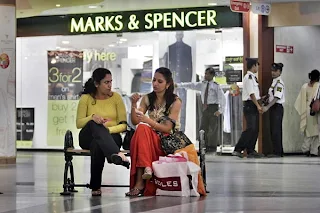Later today President Obama gives his speech before Congress outlining his proposals to spur job growth. The Democrats at least are likely to keep pushing the jobs issue to the forefront, though how successfully remains to be seen. Despite persistent high unemployment and underemployment, there wasn't a lot of prominent and consistent attention towards the jobs issue until now, as several commentators have noted.
In a way this inattention was surreal, but telling. Apart from the attention focused on health care costs--a huge drag on the economy and the finances of small businesses and families--and apart from the distractions fomented by GOPer politicians, the seeming invisibility of unemployment pain was a reflection of the current corporate economy.
With financial corporations bailed out by huge government loans, the world economy avoided a catastrophic implosion in 2008 and 2009. Banks and then major corporations based in the U.S. recovered quickly. They have been rolling in cash for well over a year. Apart from a very slowly recovering housing market (due to part to banks thwarting efforts to settle foreclosures), the economy has been slowed by a lack of corporate investment in the U.S.
 |
| India |
That's the U.S. economy in the fall of 2011. It is unsustainable and it's temporary--perhaps very temporary. Everyone knows this, or at least suspects it is. Fear of the future may not be a conscious component of the denial that has become the increasingly aggressive posture of U.S. corporations, especially in fossil fuels. But it is itself the fuel.
 |
| China |
The resources of planet Earth cannot support a world of 7 billion people with the lifestyles of middle class Americans or Europeans. We would need several more planets for that. That's just the math. If peak oil hasn't been reached already, it will be soon enough. The global Climate Crisis is already wreaking havoc on food costs and supply, and in drought areas, even on human water supply. Huge populations remain available for the kind of low-wage labor and virtual (if not actual) slavery that capitalism apparently demands. But wages for skilled labor will go up, and quickly approach U.S. standards. So costs will go up for the currently deliriously wealthy global corporations.
In the short term, the U.S. economy still has a lot of residual strength. Some of it may even spark an upturn next year. Buried in the dismal employment numbers last month were continuing growth in health care jobs--a sign that the affordable care act is not depressing employment, and may be spurring it, as its major provisions unfold. There are other positives that may pay off.
But that residual strength can also mask a situation that may well be worse than it might appear. America is still awash in cheap stuff. People don't look like people looked in the Great Depression. They are better clothed, they have TVs etc. Food is still plentiful, even if what's cheaply available is bloating people to a grotesque degree and creating long-term health problems. The first visible sign of trouble now is housing, and that's likely the first to become very obvious. We've somehow learned to live with a degree of homelessness that was unthinkable between the Depression and the 1980s. But it could get more obviously worse.
All that Americans have to hang their hopes on at the moment is their vote, and GOPers are aggressively trying to take their right to vote away from them. It's hard to see how an election can be really decisive, since 2008 turned out not to be. But it was always going to take more than one election. Then there's some hope in the demographics, which is what's driving a lot of current politics: it's the last of the white supremacists, now driving the GOP. The economy itself may spring a few surprises, but when corporations seem so blindered that they don't care about the catastrophic future they are creating--along with the equally cynical fostering of present pain--they can't be counted on to do anything but evil.













No comments:
Post a Comment